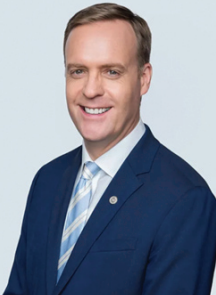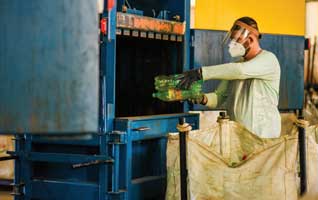Sustainability: Breaking the cycle of Asia’s mismanaged wastes

Collaborative efforts from the public-private sectors and various organisations, such as the Alliance to End Plastic Waste, offer solutions to successfully manage waste in countries with limited waste management resources. PRA (www.plasticsandrubberasia.com) conducted an interview with Nicholas Kolesch, Vice President of Projects, to provide insight into the state of plastic waste in Asia.
Plastic pollution presents a global challenge and current plastic waste management practices are causing severe harm to marine life, nature, and the surroundings, especially in Southeast Asia where resource limitations complicate waste handling.
The Circulate Initiative's research highlights the potential for substantial positive change. By improving plastic waste management, significant reductions in greenhouse gas (GHG) emissions can be achieved. Focusing on India, Indonesia, Malaysia, Thailand, the Philippines, and Vietnam, the study reveals that recycling mismanaged plastic waste could have an impact equivalent to shutting down 61 coal-fired power plants.
Rectifying the disposal of just 1-tonne of plastic waste instead of burning it could prevent the release of 3 tonnes of harmful gases. Further, prioritising recycling over incineration could prevent 20 million tonnes of pollution by 2030 and help achieve a 10% reduction in global plastic pollution through region-specific recycling goals.
Holistic strategies for managing Asia’s wastes
Addressing plastic pollution presents a multifaceted challenge that requires collaboration throughout the entire plastic value chain and at every stage of the plastic life cycle. Without active involvement and commitment from governments, social organisations, industry stakeholders, the private sector, and consumers, achieving a comprehensive global solution will remain elusive
Established in 2019, the Alliance to End Plastic Waste (Alliance), a global non-profit organisation, is on a mission to eliminate plastic waste from the environment. It comprises around 50 major global companies, including BASF, Berry Global, Braskem, Chevron Phillips, Clariant, Covestro, CP Group, Dow, DSM, ExxonMobil, Formosa Plastics Corporation USA, Henkel, LyondellBasell, Mitsubishi Chemical Holdings, Mitsui Chemicals, Nova Chemicals, OxyChem, PolyOne, Procter & Gamble, Reliance Industries, SABIC, Sasol, Shell, Suez, SCG Chemicals, Sumitomo Chemical, Total, Veolia, and Versalis (Eni).
In an email interview conducted by PRA (www.plasticsandrubberasia.com), Nicholas Kolesch, Vice President of Projects, provides insight into the state of plastic waste in Asia, the impact of waste management efforts, and the concerted actions being taken by industry players. At the core of these actions is the role played by the Alliance in closing the gaps in circularity and driving meaningful change
PRA: Achieving the UN's goal to reduce plastic pollution by 80% by 2040 might not be realistically attainable, as indicated by research. Do you believe that this target is achievable?
Kolesch: Plastic waste is a complex challenge and requires investments on multiple fronts. Reducing the annual flow of plastic waste into the ocean by 80% will require collective action through public-private-people partnerships and substantial capital investment, of which a significant portion can come from the private sector. The Alliance is focused on convening players across the plastics value chain including brands, waste managers, recyclers and enablers, and producers to do this.
Globally, we will need significant amounts of money to be directed towards solving this problem, coupled with the political will necessary for these changes to occur so that we can achieve a real impact.
The Alliance is responsible for providing a healthy amount of funding to build solution models and help demonstrate what works. However, we are just one piece of the puzzle when it comes to addressing this issue.
In our efforts to unite the plastic value chain and the broader investor community to reverse plastic pollution, the Alliance partnered with Lombard Odier to catalyse private sector investments in circular plastic and support more research and innovation in circularity. The fund will target investments in the plastics value chain, particularly in new materials and improvements in collection and recycling.
By participating in the Alliance and collaborating across the plastic value chain, our members also demonstrate their commitment to eradicating plastic waste from the environment through technology and infrastructure development investments across the lifespan of plastic.
Asia, a bastion for climate-positive solutions Six
Southeast Asian countries produce over 31 million tonnes/year of plastic waste, which extends across borders via rivers and coastlines, worsened by the global plastic trade. As plastic demand grows, so does waste generation, especially in countries with inadequate waste management practices. Can a solution be found for this complex challenge?
PRA: Given the increasing demand for plastics, especially in Asia, and with no signs of this demand slowing down – how crucial is it for economies to prioritise reducing plastic waste and improving waste management?
Kolesch: Global plastic demand is expected to nearly triple by 2050. We know that plastic is an essential part of not just the economy, but day-to-day life for people all over the world. The focus needs to be on creating a suite of solutions, including upstream ones, which can help to meet the challenge at all stages from design and recycling, to introducing more circular models for plastic such as refill and reuse.
PRA: Regarding your programmes related to Asia, are there any obstacles to executing these initiatives or projects in the region?

Kolesch: When working with smaller organisations, particularly social enterprises, they often lack administrative infrastructure and the ability to demonstrate a scalable proof of concept. Brazil's Recicleiros (which implements selective collection and recycling in municipalities) illustrates this by establishing mechanisms to organise cooperatives, offering a framework for the informal sector. This creates confidence for the municipality as they observe successful implementations in other places, enabling replication through laws, fostering effective partnerships and trust for these organisations in their operating cities.
PRA: Considering the significant efforts by the Alliance in implementing circular projects in Asia, where does the Alliance currently stand in its mission to eliminate plastic waste in Asia?
Kolesch: We are focused on projects that advance a circular plastic economy. Our goal is to demonstrate effective strategies and subsequently expand and replicate proven solutions. This vision is materialising as our projects mature.

To date, our portfolio comprises over 50 projects in different sizes and implementation stages. We have diverted over 38,000 tonnes of plastic waste from the environment and recycled more than 39,000 tonnes.
In Southeast Asia, we primarily work in highleakage countries, acknowledging the global nature of the plastic issue and the need for diverse local solutions within each region and country.
Our investment addresses both waste diversion and recycling incentives, aiming to tackle the extensive challenge. While the Alliance holds a transformative role, we understand collaboration is key and work with like-minded partners to develop a range of solutions for the plastic waste challenge.
(PRA)
Subscribe to Get the Latest Updates from PRA Please click here
©2023 Plastics and Rubber Asia. All rights reserved.

©2023 Plastics and Rubber Asia. All rights reserved.
Home Terms & Conditions Privacy Policy Webmail Site Map About Us



















